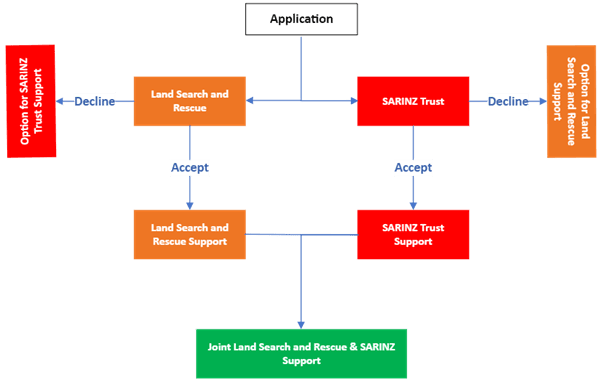2002
The year we were formed and began meeting our Trust Deed
$750k+
The amount of research we have directly funded or managed across the SAR Sector in NZ
1
Our core focus is NZ based research to benefit SAR response here and around the world
R&D Application Process
Search and Rescue Institute New Zealand (SARINZ) Trust and Land Search and Rescue are working collaboratively with our respective Innovation and R&D Funds. Funding is available from the SARINZ Trust and Land Search and Rescue as separate entities or as joint funding, using one common application form. Each entity will evaluate the application separately and make a funding decision. The diagram below shows the process.

Initial Proposal
To minimize the investment of time and effort in projects which may not receive our support, investigators should submit an initial proposal for consideration.
All initial proposals should address the following areas:
- Project description
- Purpose and expected benefits
- Principal investigators
- Basic methodology
- Time frame for completion
- Firm quote for the project (phased if necessary); and
- The format in which findings/production will be presented and how the information is intended to be used.
A draft template for initial research and development proposals is available as a MS Word (docx) template for download below or alternatively you can complete the online application form.
Projects which are joint funded will have preference.
Evaluation of initial proposal
The Trust will consider all applications each year in the 8 weeks that follow the application close dates of:
- 30 April (with outcomes confirmed no later than 30 June)
- 30 September (with outcomes confirmed no later than 30 November)
The Trust will meet to determine the:
- Relevance of the project to SAR (in New Zealand and internationally)
- Likelihood of a successful outcome
- Cost effectiveness of the proposal
- Potential to commercialise to outcomes of the proposal
- Completeness and accuracy of the proposal information
- Meet with the project initiator and others to seek clarification if required
- Whether the proposal would benefit from the involvement of research partners
- Whether a full research proposal should be sought and
- If the proposal is not approved, suggest any alternative avenues of funding and support.
The Trust will advise each applicant via email of the outcome.
Request for full proposal
Where a project helps to meet the objectives of the Trust, and where there is a high probability of a successful outcome, the Trust may approve the project as submitted through Appendix 1 or may request a more detailed Research Proposal. A MS Word template for a Full Research and Development proposal, Appendix 2, is available below if required.
Final approval of proposal
Following receipt of any Full Research and Development Proposal the Trust will determine:
- Relevance of the project to SAR (in New Zealand and internationally);
- Likelihood of a successful outcome;
- Cost effectiveness of the proposal;
- Potential to commercialise to outcomes of the proposal;
- Completeness and accuracy of the proposal information;
- Meet with the project initiator and others to seek clarification if required;
- Rank the proposal and decide on funding priorities.
- Where expertise in a particular area does not exist within the Trust; the Trust may seek to co-opt this expertise and take the best advice available;
- Approve the research and development initiative;
- Ensure that all intellectual property and copyright issues are satisfactorily addressed to ensure that the project outcomes are available to all interested parties and the New Zealand public at no cost. This may be in the form of a Creative Commons licence (or similar).
- Shall be formally recognised as the funder, co-funder or contributing funder (as appropriate) in the completed works.
- Implement a strategy for monitoring the progress of the research to ensure the funding meets agreed objectives and outcomes;
- Authorise payments to the researchers according to agreed and prescribed manner;
- Support any media liaison and the efficient and effective dissemination of all findings resulting from the expenditure of SARINZ funds in research and development in accordance with the agreed process (i.e. Creative Commons licence).